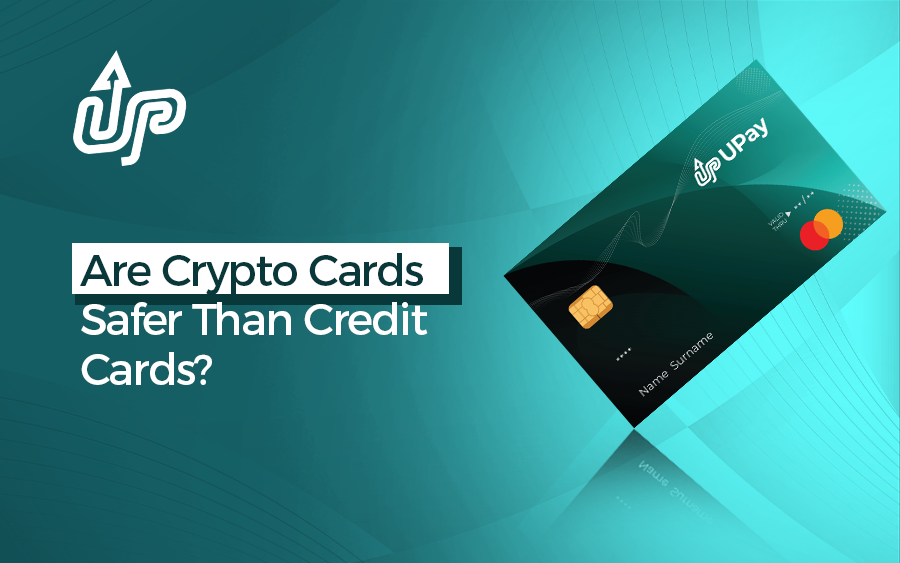Cryptocurrency has made significant strides in the global financial landscape, yet its widespread adoption still faces hurdles. Many governments and businesses remain hesitant to embrace digital assets, creating challenges for everyday use.
To help bridge this gap, innovative tools like crypto cards have emerged. These cards enable users to spend cryptocurrency for daily purchases by automatically converting it into fiat currency at the point of sale.
So, are crypto cards safer than credit cards? The safety of crypto cards versus traditional credit cards isn’t a simple yes or no.
While crypto cards benefit from blockchain’s security features, such as decentralization and immutable transaction records, most operate on the same payment networks, such as Visa or Mastercard, and are subject to similar vulnerabilities during point-of-sale transactions.
Meanwhile, credit cards benefit from decades of regulatory oversight, fraud protection systems, and consumer protections like chargebacks.
This article explores the security features, potential risks, and best practices for using crypto cards to help you understand how they stack up against traditional credit cards.
What Are Crypto Cards?
Crypto cards function similarly to traditional debit or credit cards but are designed to facilitate transactions using cryptocurrency. These cards are typically issued by cryptocurrency platforms in collaboration with major payment networks like Visa and Mastercard.
They allow users to spend their digital assets at merchants that accept traditional card payments, with the cryptocurrency being automatically converted to fiat currency (e.g., USD, EUR) at the point of sale.
Types of Crypto Cards
- Crypto Debit Cards: These cards are preloaded with cryptocurrency, which is converted to fiat currency at the time of purchase. Users can only spend the amount loaded onto the card, making them similar to traditional debit cards.
- Crypto Credit Cards: These cards function like traditional credit cards but offer crypto-based rewards instead of cashback or points. Users can earn cryptocurrency for every purchase made, which can be held or reinvested.
Read Also: Can You Use Crypto Credit Cards Anywhere?
Are Crypto Cards Safer Than Traditional Credit Cards?
Source: FreePik
The safety of crypto cards compared to traditional credit cards depends on several factors. Here’s a breakdown of key differences:
1. Fraud Protection
Credit Cards:
- Strong consumer protections (e.g., zero-liability policies, chargebacks).
- Banks often refund unauthorized transactions.
Crypto Cards:
- Typically, no chargebacks (transactions are irreversible like crypto itself).
- Some providers offer limited fraud protection, but it’s not as robust as credit cards.
2. Exposure to Theft
Credit Cards:
- If compromised, thieves can spend up to the credit limit, but you’re usually not liable.
Crypto Cards:
- If linked to a hot wallet, hackers could drain crypto funds if they gain access.
- If using a prepaid debit model, only the loaded amount is at risk.
3. Privacy & Anonymity
Credit Cards:
- Tied to your identity, requiring KYC (Know Your Customer) checks.
- Transactions are tracked by banks and credit bureaus.
Crypto Cards:
- Some offer partial privacy (e.g., no credit checks).
- If using a non-KYC crypto card, transactions may be harder to trace back to you.
4. Security Features
- Both can have chip & PIN, virtual card numbers, and 2FA.
- Crypto cards may rely more on self-custody security (e.g., protecting your private keys).
5. Currency Risk
Credit Cards:
- No volatility risk (charged in fiat).
Crypto Cards:
- If spending crypto, volatility could mean your card balance loses value quickly.
Verdict:
- For fraud protection, credit cards are safer due to chargebacks and liability policies.
- For privacy, some crypto cards offer better anonymity.
- For fund security, crypto cards depend on how you store your crypto (cold storage = safer).
Crypto Cards vs. Credit Cards
Source: FreePik
| Feature | Crypto Cards | Credit Cards |
| Security | High (2FA, cold storage, decentralized) | Moderate (vulnerable to breaches, identity theft) |
| Fraud Risk | Low (irreversible transactions, no personal banking data) | High (susceptible to data breaches, chargeback fraud) |
| Usability | Limited (only accepted at specific merchants) | Universal acceptance |
| Fees | Varies (exchange fees, withdrawal limits) | Interest rates, foreign transaction fees |
| Rewards | Crypto cashback, staking rewards | Cashback, travel points |
Expert Tips for Using Crypto Cards Safely
Source: FreePik
To maximize the security and benefits of crypto cards, it’s crucial to be aware of potential risks and take proactive measures.
- Use Hardware Wallets: Store the majority of your cryptocurrency in a hardware wallet (e.g., Ledger, Trezor) rather than keeping it on the card. This minimizes the risk of losing funds in case of a security breach.
- Enable 2FA: Always activate two-factor authentication for transactions and account access to add an extra layer of protection.
- Monitor Transactions: Regularly review your transaction history to detect any unauthorized activity.
- Keep Private Keys Secure: Never share your private keys or recovery phrases with anyone. These are essential for accessing your funds and must be stored securely.
- Use Trusted Providers: Only use crypto cards issued by reputable platforms like Upay to ensure reliability and security.
Related: Cryptocurrency Wallets: Virtual Crypto Cards vs. Debit Cards
Conclusion
Crypto cards represent a significant innovation in the financial world. They serve as a bridge between the growing cryptocurrency market and everyday transactions. Crypto cards offer a secure and innovative way to spend cryptocurrency. However, their safety and practicality compared to traditional credit cards remain a topic of debate.
Crypto cards boast advanced security features such as encryption, tokenization, two-factor authentication (2FA), and decentralized transactions, which reduce the risk of fraud and data breaches. However, crypto cards are not without risks. The irreversible nature of cryptocurrency transactions means that any mistakes or thefts can result in permanent loss of funds.
Traditional credit cards, on the other hand, have decades of development in fraud prevention and consumer protection. Nonetheless, they are also not immune to risks, as centralized systems are prime targets for large-scale data breaches and identity theft.
Ultimately, the choice between crypto cards and traditional credit cards depends on the user’s comfort with technology, their understanding of cryptocurrency, and their specific financial needs.
For tech-savvy individuals who value decentralization and control over their funds, crypto cards can be a secure and innovative option. For those prioritizing convenience and widespread acceptance, traditional credit cards remain the better choice.
FAQs
Are crypto cards safer than credit cards?
Crypto cards offer advanced security features like decentralization and 2FA, but lack fraud recovery options. Traditional credit cards provide stronger consumer protections.
Can I use crypto cards anywhere?
Crypto cards are accepted at merchants that support traditional card payments, but their usability is more limited compared to universally accepted credit cards
What security features do crypto cards have?
They use encryption, tokenization, 2FA, and cold storage to protect user funds and data.
Where can I get a crypto card?
Crypto cards are offered by various cryptocurrency platforms and financial service providers. For example, UPay offers crypto cards that allow users to seamlessly convert and spend their cryptocurrency for everyday purchases.








